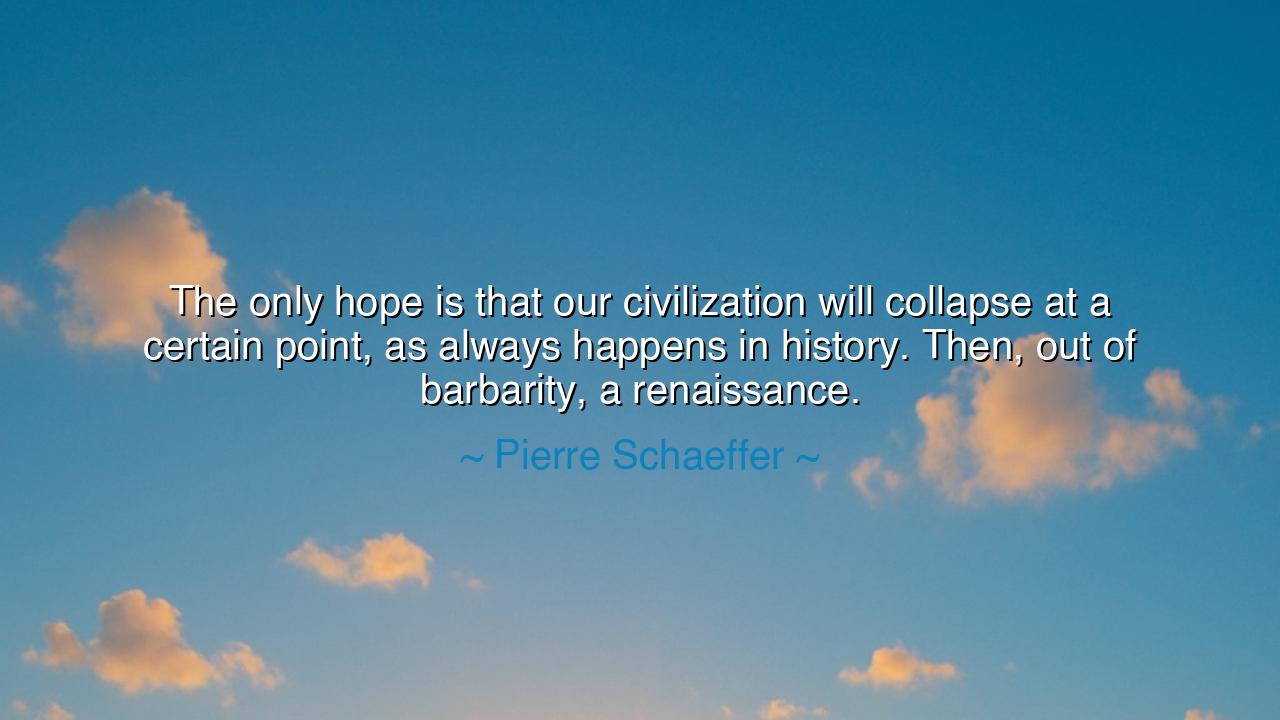
The only hope is that our civilization will collapse at a certain
The only hope is that our civilization will collapse at a certain point, as always happens in history. Then, out of barbarity, a renaissance.






“The only hope is that our civilization will collapse at a certain point, as always happens in history. Then, out of barbarity, a renaissance.” Thus spoke Pierre Schaeffer, a man of vision and paradox, an artist who heard music in the noise of machines and foresaw wisdom in the ashes of decay. His words sound at first like despair—a wish for destruction—but beneath them lies the ancient rhythm of renewal, the eternal pattern by which all things that live must die, and in dying, be reborn. For Schaeffer, the collapse of civilization was not the end, but the necessary clearing of the field, the fallow season before the seed of beauty and truth could grow again.
In the age of the ancients, this truth was already known. The philosophers of Greece, the poets of Rome, the prophets of the East—all spoke of the cycles of rise and ruin. Empires, like living beings, flourish and decay; they grow fat on their own brilliance, forget their founding virtues, and crumble under the weight of their own excess. Schaeffer’s insight is that this pattern is not a tragedy but a form of hope. For when all that is hollow has fallen, the human spirit, stripped of illusion, rediscovers its strength. Out of barbarity, he says, comes renaissance—the wild soil from which the flower of culture must bloom anew.
In his own life, Pierre Schaeffer witnessed this cycle firsthand. Born in the wake of one world war and coming of age through another, he saw Europe torn apart by its own machinery—its progress turned to weapon, its science to destruction. Yet from that ruin came something astonishing: the birth of a new sound, a new art, a new way of hearing the world. Schaeffer, the father of musique concrète, took the fragments of modernity—the hum of engines, the grind of steel, the noise of broken things—and made from them music. He embodied the very principle of his quote: that even from the wreckage of civilization, the creative spirit endures, reshaping chaos into beauty.
History bears countless examples of this sacred cycle. When Rome fell, it seemed as though light itself had gone out. The libraries burned, the roads crumbled, and the empire dissolved into centuries of darkness. Yet from that so-called barbarity emerged a new dawn—the Renaissance, when forgotten wisdom was reborn and art once more became the vessel of spirit. Similarly, when the Black Death swept across medieval Europe, it left despair in its wake, but also transformation: a breaking of feudal chains, a rebirth of science, and a questioning of old hierarchies. So it has always been—the ruin of one age becomes the womb of another.
Schaeffer’s quote speaks also to the danger of complacency. When civilizations become too comfortable, too enamored with their own perfection, they begin to rot from within. Technology replaces wonder; consumption replaces meaning; noise drowns out music. In such times, collapse is not punishment, but purification—a necessary humbling of humanity before the forces it has forgotten how to honor. To Schaeffer, the artist and philosopher, the fall of civilization is not destruction by fire, but cleansing by flame—the burning away of falseness, so that truth may once again stand revealed.
And yet, his words are not a call to surrender to doom. They are a reminder that hope often hides in the ruins. When the towers of certainty fall, when the structures of power fail, humanity remembers its most ancient gift: the ability to create. The renaissance that follows barbarity is not automatic; it is forged by those who still dare to dream in the ashes. It belongs to those who keep their faith not in the endurance of systems, but in the resilience of the human soul. Every fall, Schaeffer teaches, contains within it the seed of a greater rising—if only we have the courage to plant it.
So let this be your lesson: do not fear the fall of the world, but fear the stagnation that precedes it. Every age must one day collapse; the wise do not cling to its crumbling walls, but prepare to build anew. When the music of your time grows hollow, become the composer of the next song. When the old forms die, let your imagination be the soil of rebirth. For civilization is not a monument of stone—it is a living current that flows through human hearts, broken and remade across centuries.
And remember, as Pierre Schaeffer reminds us, that every collapse is the beginning of a renaissance. Out of barbarity may come brutality, yes—but also beauty. Out of ruin may come silence—but also song. The true artist, the true thinker, the true human does not despair at the fall of the old world; they listen, and in the echoes of its ruin, they begin to craft the harmonies of the new.






AAdministratorAdministrator
Welcome, honored guests. Please leave a comment, we will respond soon